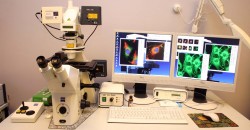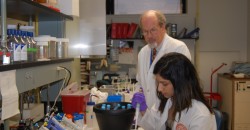Archive for Research
HLD DR3 antigen affects response to Thygeson’s Superficial Punctate Keratitis
In 1981, Richard W. Darrell, MD, reviewed literature relating to TSPK and its association with a histocompatibility antigen HLA DR3. Both HLA D and HLA DR antigens are associated with the immune response genes, and HLD DR3 antigen may interfere with the immune response of patients of Thygeson’s Superficial Punctate Keratitis to endogenous and exogenous […]
Patient Diagnosis and Management of Thygeson’s Superficial Punctate Keratitis
Thygeson’s Superficial Punctate Keratitis (TSPK) is a chronic eye disease that has remissions and exacerbations for a few years to decades. Patients typically present with whitish-grey, intraepithelial corneal lesions with no or limited conjunctival involvement. While the etiology of the disease remains controversial, it does have a genetic association with HLA-DR3, which is an antigen […]
Cyclosporine Ophthalmic Emulsion 0.05% – Restatis by Allergan
Produced as a sterile, preservative-free emulsion made from a white powder, Cyclosporine acts as a topical immunomodulator that has an anti-inflammatory effect. While Cyclosporine is the active ingredient, there are a number of inactive ingredients including polysorbate 80, glycerin, carbomer copolymer type A, castor oil, purified water, and sodium hydroxide to adjust its pH level. […]
Thygeson’s Superficial Punctate Keratitis Imaging Studies

Phillips Thygeson is who Thygeson’s Superficial Punctate Keratitis (TSPK) is named after when he identified and first published details in the American Medical Journal over 60 years ago in a 1950 issue. Treating the symptoms of TSPK is carried out in many ways and the methods chosen may depend on the attending physician and the […]
Thygeson’s Superficial Punctate Keratitis Laboratory Studies

The truth is that Laboratory Studies regarding the cause of Thygeson’s Superficial Punctate Keratitis (TSPK) have failed to determine the cause or causes of this disease. It is reported that medical personnel can try culturing the flora when there is active inflammation of the cornea, but it will not affect the management, diagnosis, or treatment […]
